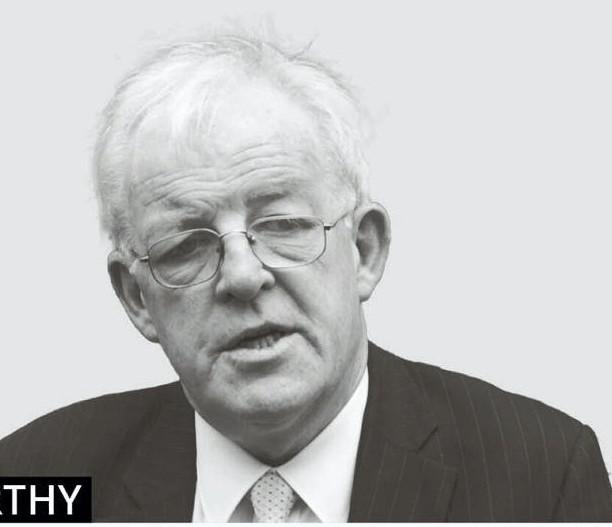Irish business firms are uncovering new problems with Britain’s EU exit every day, with no clarity about the trading relationship which will eventually emerge. No definitive end to the uncertainty is likely until the post-withdrawal deal is finalised, which could be several years away.
In the meantime, the Brexit decision poses a risk to the survival of the European Union, since there are strong Eurosceptic parties in several countries, including France and Italy, two of the key surviving members. Even in Germany, there is a populist and Eurosceptic party on the rise.
Opinion polls show that electorates, not just in Britain, have been blaming the EU for their troubles and there is enthusiasm for referendums that, in some cases, could go either way. This will complicate the British exit negotiations: continental governments will not wish to make it easy for the British, for fear of encouraging referendum demands in their own countries. Pleading Britain’s case for a favourable deal is not popular right now.
But Ireland has every interest in a good deal for Britain, so there is a diplomatic dilemma: the Government will not wish to cast itself as chief cheerleader for their departing ally, seen as deserving punishment by so many European politicians. Since Britain will be Ireland’s nearest neighbour and biggest trade partner in any plausible scenario, Irish politicians can hardly join the screw-the-Brits movement either.
Britain may be leaving the European Union, but it is not about to depart these waters and relocate in the South Pacific. The reactive Anglophobia evident in Europe will fade and saner voices will eventually prevail.
It is in everyone’s interests to fashion a close partnership between Britain and Europe and most decidedly in Ireland’s interests. Theresa May, incoming prime minister as her rivals have tripped up one by one, will seek a practical route to damage limitation, implementing the referendum decision while keeping trade and political ties as close as possible.
There is an extraordinary irony here: the Leave politicians (those still standing) are agreed on the desirability of the least disruptive exit possible, while Remain campaigners did not want any disruption at all. The majority view in both the main parliamentary parties, Conservative and Labour, is that Britain should have stayed with the EU. Lawyers seem to agree that the referendum decision cannot be implemented without legislation in parliament, where a decisive majority is opposed to exit.
The Leave campaign argued that a vote to quit would restore parliamentary sovereignty. But outsourcing the decision to a popular vote in the first place was a surrender of the very same principle, the core of the British constitution. Referendums in Britain are infrequent and always opportunistic: the constitution is enshrined in legislation and no government is required to hold a plebiscite on any issue. Britain chose to join the European Economic Community back in 1972 through a parliamentary vote and could have left the same way, with parliamentary sovereignty intact.
Moreover, the survival of the United Kingdom in its current form is threatened: a repeat Scottish referendum could choose independence and attain continued EU membership, meaning an external land border for the EU on both of these islands.
Anyone watching the television performances of the leading British politicians in the days immediately following the referendum will have noted their indecisiveness, even bewilderment. It is clear that a Leave result had not been foreseen, even by its supporters.
Negotiations
To the question ‘‘what happens next?’’ there was no answer and there will be none, even as to negotiating timetable and procedures, until October at the earliest. The British government appears to have no agreed objectives whenever these negotiations start and David Cameron apparently forbade the civil service from developing contingency plans. The most prominent Leave campaigners have departed frontline politics and have accepted no responsibility for implementing the decision which they advocated.
It was David Cameron’s choice back in January 2013 to promise his Tory party Eurosceptics the referendum they sought. He was under no constitutional requirement to do so and the scale of the risk should have been clear. Any Irish politician could have told him that governments regularly lose referendums and the opinion polls at the time were close.
There was no majority in parliament for EU exit and no prospect of such a majority arising. His party was trailing Labour and his fateful decision was motivated by party management concerns. He duly won the election in 2015 but lost the referendum and his leadership, at great cost to Britain and Europe.
The thoroughbred yearling sales get going in Deauville next month. When the purchasers despatch their acquisitions to the training yard, they must register a name and owners like to pick something topical. Cameron’s Folly would make a nice name for a horse.
Read more
Full coverage: Brexit
Irish business firms are uncovering new problems with Britain’s EU exit every day, with no clarity about the trading relationship which will eventually emerge. No definitive end to the uncertainty is likely until the post-withdrawal deal is finalised, which could be several years away.
In the meantime, the Brexit decision poses a risk to the survival of the European Union, since there are strong Eurosceptic parties in several countries, including France and Italy, two of the key surviving members. Even in Germany, there is a populist and Eurosceptic party on the rise.
Opinion polls show that electorates, not just in Britain, have been blaming the EU for their troubles and there is enthusiasm for referendums that, in some cases, could go either way. This will complicate the British exit negotiations: continental governments will not wish to make it easy for the British, for fear of encouraging referendum demands in their own countries. Pleading Britain’s case for a favourable deal is not popular right now.
But Ireland has every interest in a good deal for Britain, so there is a diplomatic dilemma: the Government will not wish to cast itself as chief cheerleader for their departing ally, seen as deserving punishment by so many European politicians. Since Britain will be Ireland’s nearest neighbour and biggest trade partner in any plausible scenario, Irish politicians can hardly join the screw-the-Brits movement either.
Britain may be leaving the European Union, but it is not about to depart these waters and relocate in the South Pacific. The reactive Anglophobia evident in Europe will fade and saner voices will eventually prevail.
It is in everyone’s interests to fashion a close partnership between Britain and Europe and most decidedly in Ireland’s interests. Theresa May, incoming prime minister as her rivals have tripped up one by one, will seek a practical route to damage limitation, implementing the referendum decision while keeping trade and political ties as close as possible.
There is an extraordinary irony here: the Leave politicians (those still standing) are agreed on the desirability of the least disruptive exit possible, while Remain campaigners did not want any disruption at all. The majority view in both the main parliamentary parties, Conservative and Labour, is that Britain should have stayed with the EU. Lawyers seem to agree that the referendum decision cannot be implemented without legislation in parliament, where a decisive majority is opposed to exit.
The Leave campaign argued that a vote to quit would restore parliamentary sovereignty. But outsourcing the decision to a popular vote in the first place was a surrender of the very same principle, the core of the British constitution. Referendums in Britain are infrequent and always opportunistic: the constitution is enshrined in legislation and no government is required to hold a plebiscite on any issue. Britain chose to join the European Economic Community back in 1972 through a parliamentary vote and could have left the same way, with parliamentary sovereignty intact.
Moreover, the survival of the United Kingdom in its current form is threatened: a repeat Scottish referendum could choose independence and attain continued EU membership, meaning an external land border for the EU on both of these islands.
Anyone watching the television performances of the leading British politicians in the days immediately following the referendum will have noted their indecisiveness, even bewilderment. It is clear that a Leave result had not been foreseen, even by its supporters.
Negotiations
To the question ‘‘what happens next?’’ there was no answer and there will be none, even as to negotiating timetable and procedures, until October at the earliest. The British government appears to have no agreed objectives whenever these negotiations start and David Cameron apparently forbade the civil service from developing contingency plans. The most prominent Leave campaigners have departed frontline politics and have accepted no responsibility for implementing the decision which they advocated.
It was David Cameron’s choice back in January 2013 to promise his Tory party Eurosceptics the referendum they sought. He was under no constitutional requirement to do so and the scale of the risk should have been clear. Any Irish politician could have told him that governments regularly lose referendums and the opinion polls at the time were close.
There was no majority in parliament for EU exit and no prospect of such a majority arising. His party was trailing Labour and his fateful decision was motivated by party management concerns. He duly won the election in 2015 but lost the referendum and his leadership, at great cost to Britain and Europe.
The thoroughbred yearling sales get going in Deauville next month. When the purchasers despatch their acquisitions to the training yard, they must register a name and owners like to pick something topical. Cameron’s Folly would make a nice name for a horse.
Read more
Full coverage: Brexit









SHARING OPTIONS